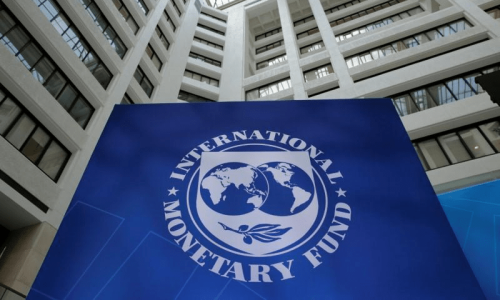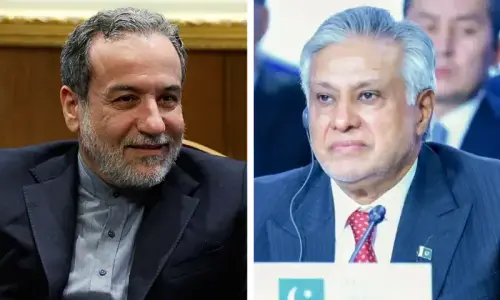ANOTHER year, another IMF document to read. We had a staff report to read in 2021, another in 2022 and here we are in 2023, poring over yet another. There is a lot to write about in these documents but this year is different.
Having read these staff reports and Article IV reports and Memoranda of Economic and Financial Policies and Letters of Intent for a decade and a half now I am struck by the feeling that I am reading the same document year after year after year. It’s a tale without a plot.
Since 2008, Pakistan has been continuously under IMF supervision. Over these 15 years there have been four programmes (the current Stand-by Arrangement included). Count the years and you’ll notice that out of these 15 years, it has spent 11 under Fund programmes.
Those years when it was not under a Fund programme it spent preparing to get onto one. In that sense, the past decade and a half has been one long (albeit discontinuous) IMF programme.
Take a look at some snapshots from these reports from over the years to get an idea of how they all sound the same. Here are some examples.
In 2008, the circular debt had just taken off and one of the Fund’s reports noted that it had risen from Rs51 billion to Rs189bn, or about 1.5 per cent of GDP, in less than five months. This is what the government told the Fund in its Letter of Intent from March 2009: “We plan to resolve inter-corporate debt in the energy sector (circular debt),” the letter said, signed by then finance minister Shaukat Tarin.
“[W]e are preparing a plan to address ongoing losses on account of operational and collection losses of distribution companies, Pepco and an independent power producer,” the letter continued.
The IMF reports feature the same problems being discussed over and over again all through the decade.
Now fast forward to 2013. The Letter of Intent that year noted that the government had cleared Rs503bn worth of circular debt accumulation and went on to make this promise.
“Beyond adjusting tariffs and reducing costs to reach full-cost recovery, we are implementing a plan to resolve the difficult legacy of circular debt arrears.” They vowed to hire a “professional audit firm” to make a comprehensive report of why this debt continued to climb “and based on the findings of the report we will design a roadmap to prevent the accumulation and recurrence of payable arrears”.
That’s not all. The report prepared by the IMF staff as part of that programme noted that “Pakistan’s energy crisis threatens the broader economy”. That was the year when crippling loadshedding gripped the country as the elections approached. Remember the severe gas shortages of the early 2010s? The loadshedding?
“The sector is burdened with structural problems, price distortions, insufficient collection, theft, untargeted subsidies, inadequate supply, and poor governance,” the report continued. “Long and unpredictable blackouts, reaching 16 hours [per] day in some areas, have been disruptive for businesses, while adding to dissatisfaction and frustration among the population.”
Now fast forward to 2019, and this is what the IMF staff report said: “Following several years of steady decline in the flow of circular debt in the power sector, new arrears were accumulated over FYs 2018 and 2019, reaching close to PRs 800bn (around 2pc of GDP).” This was just the accumulation over those two years. The total stock of circular debt had reached 4pc of GDP by this point. “Moreover, arrears in the gas sector have now emerged, with the stock totalling over [0.5pc] of GDP” the report continued.
The problem was not only growing, but spreading. Pakistan’s own gas fields were in advanced decline by this time and LNG imports were growing rapidly. Since LNG was purchased at commercial rates (unlike domestic gas whose price was set by the government) pricing issues were now cropping up, leading to the build-up of circular debt in the gas sector as well.
Now fast forward to 2023. The latest staff report says this about the circular debt. “The energy sector’s long precarious situation has become acute, with severe liquidity pressures now adding to the continued over-accumulation of unsustainable payment arrears.” By now the stock of the circular debt has crossed Rs2.5 trillion and there is yet another plan agreed with the Fund to deal with this.
The story is the same in every other area. I have chosen the circular debt only as one example, but if I showed you what successive reports have said about revenues or the mounting external debt or wasteful spending the picture will be identical.
The reports feature the same problems being discussed over and over again all through the decade, while the problems under discussion grow in scale and spread outwards to draw other areas of the economy into their orbit. Interest payments have grown by 460pc since 2008, while tax revenues have grown by 360pc. No wonder today the debt service bill is larger than net federal revenues, a milestone the country had crossed before Covid actually.
There is a lot to say about what Pakistan will have to do in the next nine months under this programme. But one thing towers above all: Pakistan is sinking increasingly into financial and economic unviability. The rest is details.
Fact is, the country can no longer afford a modern state. It cannot even afford to operate its own economy, because doing so depletes the reserves or drives up the debt burden even higher. Somewhere, somebody has to wake up and realise that this path cannot continue. A clear decision-making centre has to emerge in the country, or these problems that are more than a decade and a half old will bury us all.
The writer is a business and economy journalist.
Twitter: @khurramhusain
Published in Dawn, July 20th, 2023































